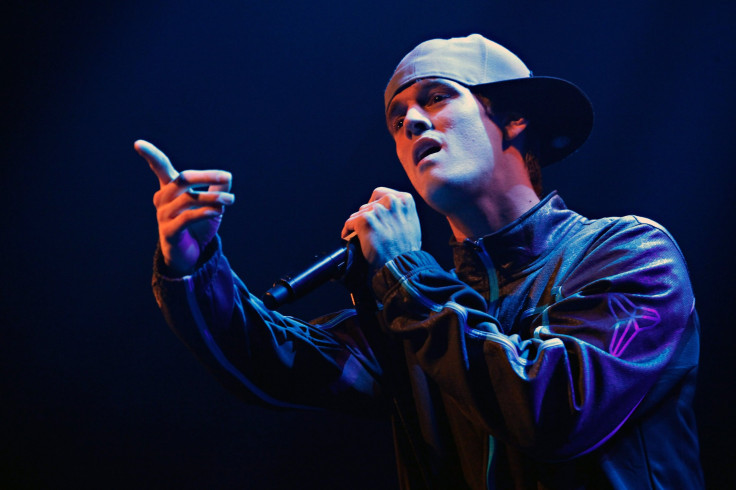Aaron Carter Reveals Bisexuality, Twitter Asks: What About Bi Erasure?

Singer Aaron Carter took to Twitter Saturday night and revealed to the world that he is bisexual. Carter talked about how he found solace through his music, but his reveal sparked conversation regarding exclusion in the LGBTQ community and society as a whole.
In a personal note he released on Twitter, Carter publicized his sexual orientation.
— Aaron Carter (@aaroncarter) August 6, 2017
POPULAR: Naked Models Pose As Flight Attendants In ‘Disgusting’ Ad Promoting Travel Site
"When I was around 13-years-old I started to find boys and girls attractive," the note read.
Carter's letter elaborated on how much of a role music played in his life.
"To me music has always been my temple. Music will ALWAYS be what transcends all of us and myself," Carter wrote.
The internet reacted, sparking conversation surrounding acceptance and other issues. Some users showed support to Carter, tweeting messages of solidarity.
LGBT activist Eric Rosswood retweeted Carter, "Congrats @aaroncarter for being true to yourself. Welcome to the family!" he wrote.
_️_Congrats @aaroncarter for being true to yourself. Welcome to the family! _ https://t.co/Q2yPS70JON
— Eric Rosswood (@LGBT_Activist) August 6, 2017
Carter’s reveal also sparked a different conversation surrounding bisexual erasure. Several users tweeted about the issue, which is when bisexuality, in general, is questioned or denied outright — which some argued happens in the LGBTQ community and society as a whole. Oppositional tweets regarding "bi erasure" typically referenced broad definitions and labels of "gay" that provide no nuance to sexual orientation distinctions within the LGBTQ community.
"aaron carter coming out as bisexual while everyone's tweeting "aaron carter is gay!!!" is an exact example of what bi erasure looks like," one user wrote.
aaron carter coming out as bisexual while everyone's tweeting "aaron carter is gay!!!" is an exact example of what bi erasure looks like
— kya (@nykaiya) August 6, 2017
"So much biphobia out there. People can only consider two sexualities: straight or gay. Nothing in between as far as they're concerned :(," another wrote.
So much biphobia out there. People can only consider two sexualities: straight or gay. Nothing in between as far as they're concerned :(
— Jacob Dunbar (@Fashiomista2017) August 6, 2017
"He is both straight and gay. The big story is the gay part. That's why people are running with it," he wrote
He is both straight and gay. The big story is the gay part. That's why people are running with it
— Psycho (@RedHeadPsycho) August 6, 2017
Many LGBTQ activists are concerned regarding the erasure of bisexual identities and experience in LGBTQ community as well as mainstream society, according to a report from the Rainbow Times.
"We have heard from countless community members about times they have had their bi+ (plus) identity passed over or invalidated, and this can be on a macro or micro level," Kate Estrop, president of the board of directors of the Bisexual Resource Center in Boston (BRC) told the Rainbow Times.
Estrop said bisexuals commonly face exclusion from discussions regarding sexual orientation.
"A news reporter might report on Pride events and say ‘gay and lesbian,’ or even, ‘gay, lesbian, and transgender,’ even in the same article or report that also used ‘LGBT’," she said. "On a more micro level, a woman might be monogamously dating a man and be perceived as straight, even if she identifies herself as bi+ (plus) … even more troubling, a person who was previously dating someone of the same gender may be ‘kicked out’ or unwelcome at queer events if they start dating someone of a different gender."
Gabrielle Blonder, a coordinator of the support groups for the BRC, reverberated Estrop’s remark.
"I’ve witnessed erasure in both pop culture and the lives of me and my friends," she told the Rainbow Times. "Bisexual characters are so rare in TV and movies, and often they’re either villains, ‘don’t like labels,’ or their bisexuality is played off as a joke."
Blonder said people have asked if her bisexuality is a phase and told her that her sexual preference "doesn’t matter" when she’s dating men. She cited terms like "gay and lesbian" or "gay rights” or "gay marriage" negatively affect bisexual people.
"It may seem like a small turn of phrase, but for someone who feels isolated or alone because of their sexual identity, it can exacerbate those feelings even further," she said.
© Copyright IBTimes 2025. All rights reserved.





















